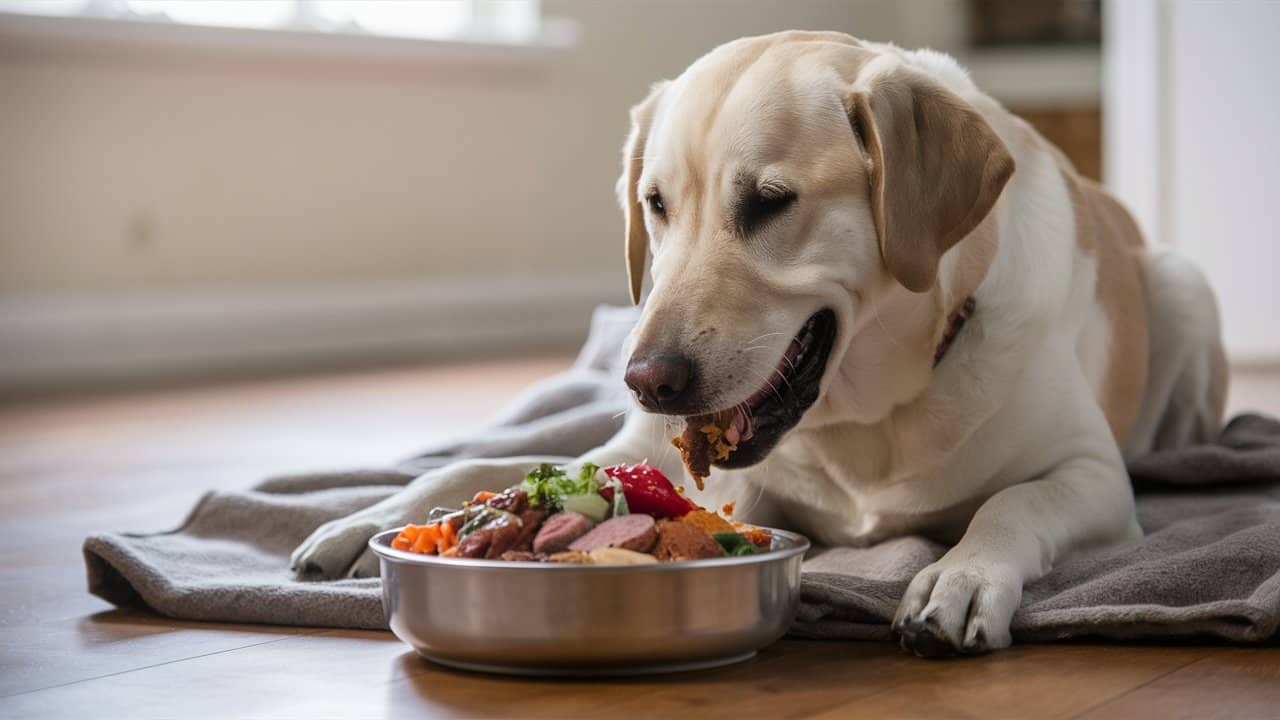Transform Your Dog’s Well-being & Happiness! Indulge in Homemade Food Recipes, Crafted for Optimal Health & Vitality.
Introduction
In today’s pet-loving society, more owners are using homemade dog food recipes to make sure their pets are getting the healthiest nourishment possible. Vet-approved substitutes are in high demand as a result of worries about the quality and ingredients of commercial dog food. Homemade dog food, which frequently contains healthful ingredients like chicken, is one popular option. This post will go into the realm of homemade dog food, discussing its advantages, dietary needs, and necessary ingredients. Remember “A well-balanced diet is the key to a happy and healthy pup.”
Why Choose Homemade Dog Food?
Nutritional Management
- The quality and quantity of ingredients in homemade dog food recipes are under your control, so you can be sure your dog is getting a balanced diet.
- Crafted to fulfill your dog’s specific nutritional needs, homemade dog food recipes with veterinarian approval support general health and well-being.
Ingredient Discrepancy
- Making your own dog food allows you to stay away from artificial additives, preservatives, and fillers that are frequently present in store-bought pet food.
- Only the best and freshest ingredients are used in your dog’s meals thanks to transparency in ingredient sourcing.
Dietary Limitations
- Since ingredients can be changed to suit individual requirements, homemade dog food recipes are perfect for dogs with particular dietary needs or food sensitivities.
Dogs’ Nutritional Needs
Before experimenting with homemade dog food recipes, it is important to understand the nutritional needs of dogs.
- Essential nutrients for a balanced diet for your dog consist of protein, carbohydrates, fats, vitamins, and minerals.
- Muscle growth and repair are facilitated by protein, which can be found in meat, fish, poultry, and plant-based alternatives.
- Fats are essential for the immune system and skin health as well as hair.
- Carbohydrates give your dog energy and fiber to keep their digestive tract healthy.
- Vitamins and minerals also help the body’s numerous functions that are necessary for long-term and general health.
Basic Ingredients of Homemade Dog Food
- High-protein foods: Lean meats, eggs, or legumes ought to be the main course of every meal.
- Sources of carbohydrates: For energy and fiber, include grains like rice, quinoa, or sweet potatoes.
- Good fats: Provide omega-3 fatty acids from plant or fish oils to support the health of your skin and coat.
- Fruit and Veggies: Make sure your dog’s diet includes a range of fruits and vegetables to give him the necessary vitamins, minerals, and antioxidants.
Commercial vs. Homemade Dog Food
Commercial dog food may not always offer the same quality and nutrition as homemade options, despite being more convenient and less expensive. Making dog food at home gives you more control over the ingredients and reduces the possibility of dangerous additives or contaminants. Furthermore, pet owners who place a high priority on their dog’s health and well-being can feel secure knowing that homemade recipes can be tailored to meet particular dietary requirements or preferences.
Key Consideration
When Making Homemade Dog Food Pet owners should take into account a number of crucial factors before starting a homemade dog food journey. A vet or dog nutritionist should be consulted to make sure that the recipes suit the unique nutritional requirements of your dog. To avoid overfeeding or nutrient deficiencies, portion sizes should be closely monitored. Further important in preventing foodborne illnesses in dogs is following recommended food safety protocols, which include fully cooking meat and properly storing leftovers.
Homemade Dog Food Recipes
Choose from a variety of mouthwatering homemade dog food recipes that are guaranteed to give your dog the best possible nutrition and taste. These recipes use a range of healthy ingredients to accommodate every dog’s dietary needs and taste preferences, from grain-free options to meals that are high in protein.
With lean chicken, brown rice, and a medley of vegetables, this easy-to-make but nutrient-dense recipe offers a balanced supper full of protein, carbs, and important minerals.
This savory stew is a great homemade dinner or a great way to warm up chilly days. It is made with tender beef, sweet potatoes, and healthy veggies.
This tasty recipe, which includes fish, mixed vegetables, and nutritious grains and provides your dog with a boost of omega-3 fatty acids and essential nutrients, is a great way to introduce seafood into their diet.
Conclusion
By providing a wholesome and delectable substitute for store-bought dog food, homemade recipes enable pet owners to put their dog’s well-being and health first at every meal. Homemade meals support canine companions’ general well-being and longevity by using fresh, healthful ingredients and customizing recipes to meet specific dietary requirements. Give your dog some homemade, lovingly prepared meals by starting to cook for them now

